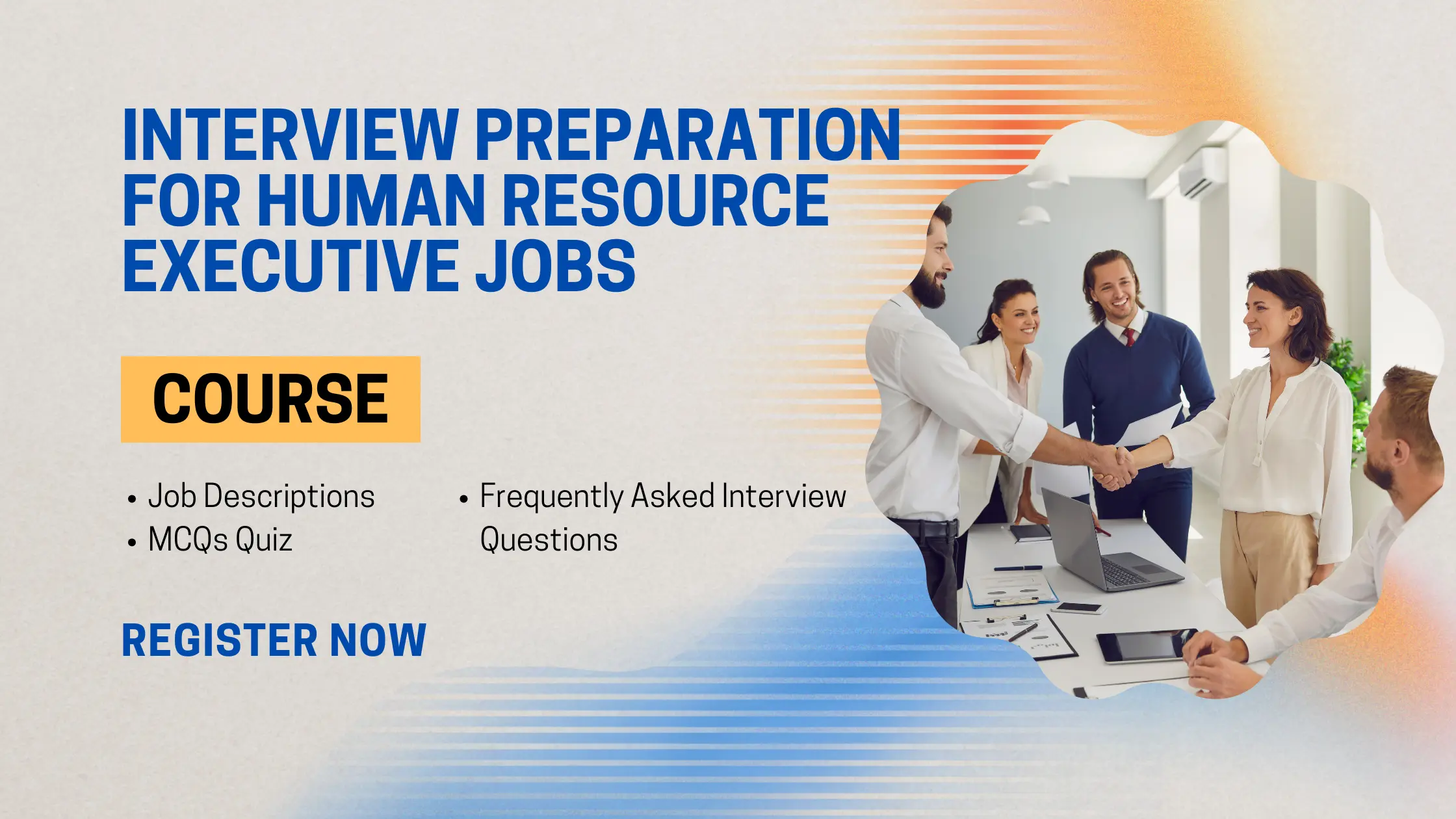Interview Preparation for HR(Human Resource) Executive Jobs

About Course
Job Description
As a Human Resource Executive, you will play a crucial role in managing various HR functions and ensuring that the organization’s human capital is aligned with its strategic goals. You will oversee recruitment, employee relations, compliance, and other HR activities to support the company’s success.
Minimum Educational Qualification:
- Bachelor’s degree in Human Resources, Business Administration, or a related field.
- Master’s degree in HR or a related field is preferred but not mandatory.
- Relevant HR certifications are a plus.
Technical Skills:
- Proficient in HRIS (Human Resources Information Systems) and software for HR management.
- Strong understanding of labor laws and regulations.
- Familiarity with payroll processing and benefits administration.
- Excellent knowledge of Microsoft Office Suite (Word, Excel, PowerPoint, etc.).
Analytical Skills:
- Ability to analyze HR data and metrics to make informed decisions.
- Strong problem-solving skills to address employee-related issues effectively.
- Capacity to assess recruitment strategies and optimize them for better results.
- Skill in evaluating employee engagement and implementing improvements.
Certifications:
While certifications are not always mandatory, they can enhance qualifications and competitiveness. Some relevant certifications include:
- Professional in Human Resources (PHR) or Senior Professional in Human Resources (SPHR) certification from the HR Certification Institute (HRCI).
- Society for Human Resource Management Certified Professional (SHRM-CP) or Senior Certified Professional (SHRM-SCP) certification.
Key Responsibilities:
- Recruitment and Staffing:
- Develop and implement effective recruitment strategies.
- Conduct job interviews and manage the hiring process.
- Ensure a diverse and inclusive workforce.
- Employee Relations:
- Handle employee grievances and conflicts.
- Promote a positive work environment.
- Address disciplinary issues following company policies and legal guidelines.
- HR Compliance:
- Stay up-to-date with labor laws and regulations.
- Ensure company compliance with federal and state HR laws.
- Manage employee records and documentation in accordance with legal requirements.
- Compensation and Benefits:
- Administer employee compensation and benefits programs.
- Conduct salary surveys and analyze compensation trends.
- Recommend changes to compensation and benefits plans.
- Training and Development:
- Identify training needs and develop training programs.
- Promote continuous learning and development among employees.
- Monitor the effectiveness of training initiatives.
- Performance Management:
- Implement and oversee the performance appraisal process.
- Provide guidance on goal setting and performance improvement.
- Manage performance-related documentation.
- HRIS and Data Analysis:
- Maintain HR databases and systems.
- Analyze HR metrics to drive data-driven decisions.
- Generate reports on HR KPIs for management.
- Diversity and Inclusion:
- Promote diversity and inclusion initiatives.
- Develop programs to foster a diverse workforce.
- Monitor progress and recommend improvements.
- Employee Engagement:
- Create and implement engagement programs.
- Conduct employee surveys and analyze feedback.
- Develop strategies to enhance employee satisfaction and retention.
- Talent Management:
- Identify high-potential employees and develop talent pipelines.
- Succession planning and career development programs.
- Ensure the organization has the right talent to meet future business needs.
- Labor Relations:
- Manage relationships with labor unions (if applicable).
- Participate in collective bargaining negotiations.
- Ensure labor agreements are adhered to.
- HR Budget Management:
- Develop and manage the HR department budget.
- Monitor HR expenses and optimize resource allocation.
Expected Salary:
- Entry-Level : $50,000 to $70,000 per year
- Mid-Level : $80,000 to $90,000 per year
- Senior-Level : $100,000 to $120,000+ per year
Course Content
Fundamentals for Human Resource Executive Job
-
Interview Questions for Fundamentals of Human Resource Executive Job
30:00 -
Quiz for Fundamentals of Human Resource Executive job
Technical Skills for Human Resource Executive Job
Analytical Skills for Human Resource Executive Job
Student Ratings & Reviews

No Review Yet